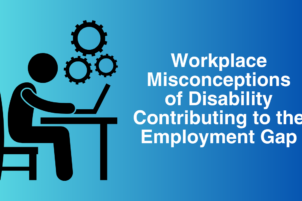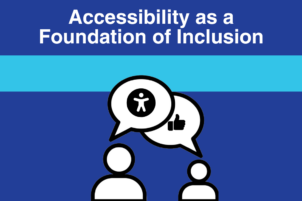The theme of this year’s National Disability Employment Awareness Month is “Access to Good Jobs For All.” A central part of creating this access lies in implementing effective workplace accommodations. For people with disabilities, accommodations represent more than just adjustments; they are essential measures needed to ensure equal employment opportunities.
The reality is that many workplaces – physical office space, virtual environments, established practices, and/or cultures – were not designed with the needs of disabled individuals in mind. This fundamental oversight often makes these spaces inaccessible, either partially or entirely, to those with disabilities. As a result, the changes made to workplaces to accommodate disabilities should not be seen as extra or unnecessary additions. Instead, they should be recognized as immediate actions that address historical exclusion.
Workplace accommodations are not luxuries; they are necessities that create environments where everyone has the same chance to thrive. They are an investment that employers should value when considering employee retention and a positive workplace culture. When employers fail to make these adjustments, it can be considered an act of discrimination, whether intentional or not. This is why the Americans with Disabilities Act (ADA) mandates that employers with 15 or more employees must provide reasonable accommodations for qualified employees, provided it doesn’t impose an undue burden on the organization.
However, while this law exists, the process for receiving accommodations often fails in practice. The ADA’s intent is to foster a cooperative dialogue between employers and employees to determine appropriate accommodations, but too often, this dialogue turns adversarial.
The Challenges of Seeking Workplace Accommodations
When an employee requests accommodations, the process typically begins with a form asking them to detail their medical condition and specify the accommodations they need. In principle, this seems straightforward, but in practice, it sets up an environment of skepticism and mistrust. Employees often must “prove” their disability by obtaining a note from a medical professional, even when their need for accommodation is clear.
While the ADA does allow for medical documentation in cases where the need for accommodation is not obvious, many employers demand this documentation for every case, regardless of how apparent the need may be. This turns the accommodation process into an invasive ordeal, stripping away the dignity and autonomy of the employee who simply seeks the ability to do their job on equal terms.
Further complicating matters, many employees are left uncertain about what types of accommodations their employer will deem “reasonable.” The law encourages an interactive discussion between employee and employer before determining whether a requested accommodation will be granted. However, employers frequently reject requests outright, labeling them “unreasonable” and then offering vague invitations to discuss alternative, unnamed “reasonable accommodations,” putting the onus back on the employee.
This adversarial approach not only undermines the purpose of the ADA but also sends a clear message that disability is seen as a compliance issue rather than a matter of diversity, equity, and inclusion. It highlights a troubling reality: many workplaces view disability accommodations as a burden to be minimized rather than a crucial step toward building a truly inclusive workforce.
Rethinking Workplace Accommodation as a Pillar of Diversity, Equity, and Inclusion
When companies treat disability accommodations as mere compliance matters, they fail to recognize the rich diversity that people with disabilities bring to the workplace. By expecting these individuals to adjust to an ableist structure rather than adjusting the environment to accommodate them fully, workplaces miss out on valuable talent, creativity, and perspectives.
To truly embrace diversity and inclusion, companies must change their approach to disability accommodations. Accommodations should not be seen as inconveniences or special favors but as essential components of a diverse and equitable workforce. A workplace that prioritizes accessibility demonstrates that it values the contributions of all its employees.
Moving Forward
Workplace accommodations are not about providing an unfair advantage to employees with disabilities; they are about leveling the playing field. As we continue to advocate for access to good jobs for all, employers must recognize that making their spaces and practices accessible is not a matter of compliance—it is a matter of equity and fairness.
The interactive process for workplace accommodations should be just that: a collaborative and respectful dialogue. Employers need to move away from adversarial postures and toward genuine conversations about how they can support all their employees in thriving.
Let us remember that access to good jobs includes access to environments where everyone—regardless of ability—can perform to their full potential. When we talk about accommodations, we’re talking about creating workplaces that are truly inclusive. This is not just an aspiration; it is a legal and moral imperative.
While some employers have the best intentions, they may not know where to start in implementing an inclusive disability accommodations strategy. Working with disability-led organizations like ours can help you meet your needs. We can provide robust and cost-effective strategies for creating a better and more accommodating environment. If you are interested, please email us at Partners@DisabilityBelongs.org.






